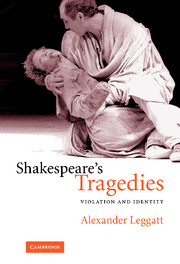Book contents
- Frontmatter
- Contents
- Acknowledgements
- A note on the texts
- Introduction
- 1 Titus Andronicus: This was thy daughter
- 2 Romeo and Juliet: What's in a name?
- 3 Hamlet: A figure like your father
- 4 Troilus and Cressida: This is and is not Cressid
- 5 Othello: I took you for that cunning whore of Venice
- 6 King Lear: We have no such daughter
- 7 Macbeth: A deed without a name
- Conclusion
- Notes
- Index
Conclusion
Published online by Cambridge University Press: 22 September 2009
- Frontmatter
- Contents
- Acknowledgements
- A note on the texts
- Introduction
- 1 Titus Andronicus: This was thy daughter
- 2 Romeo and Juliet: What's in a name?
- 3 Hamlet: A figure like your father
- 4 Troilus and Cressida: This is and is not Cressid
- 5 Othello: I took you for that cunning whore of Venice
- 6 King Lear: We have no such daughter
- 7 Macbeth: A deed without a name
- Conclusion
- Notes
- Index
Summary
We began with Lavinia dehumanized by violence; we end with Macbeth and Lady Macbeth, the perpetrators of violence, humanized. We began with Lavinia unable to name the crime because she has been physically deprived of language; we end with Macbeth and Lady Macbeth unable to name the crime because they are afraid of language. As the ideas of violation and identity develop through these seven tragedies we see a series of reactions and contradictions as one play ricochets against another; and we see an internalization of what in Titus Andronicus is physical and literal.
To begin with the contradictions: the physical assault on Lavinia includes taking her identity, which her father restores, claiming she is not just a ruined thing, she is still Lavinia. In the family, she gets her name back. The rape has been a parody of a love-encounter, beginning with conventional love-language. Romeo and Juliet come together in a genuine love-encounter which, if we put the plays together, seems to reverse and heal the violence of Lavinia's rape. While Lavinia's loss of identity is a horror, Romeo and Juliet long for a free space in which they would have no names. The involvement of their families, and of Romeo's friends, for whom their names matter, brings violence into the private world of their love and ends in a second wedding night in which Juliet's blood is shed as Lavinia's was.
- Type
- Chapter
- Information
- Shakespeare's TragediesViolation and Identity, pp. 205 - 209Publisher: Cambridge University PressPrint publication year: 2005



